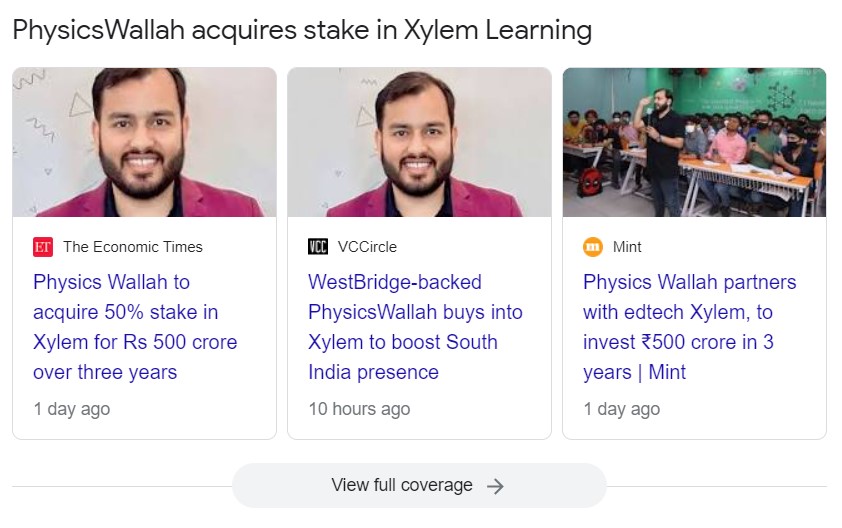As entrepreneurs, we often find ourselves contemplating missed opportunities and reflecting on the lessons learned from our startup journeys. Recently, the news of unicorn edtech firm Physics Wallah acquiring a 50 percent stake in Kerala-based edtech firm Xylem Learning for a staggering Rs 500 crore caught my attention. This news triggered a deep reflection on the biggest failure of my entrepreneurship career, which occurred even before Xylem Learning was born. In this article, I want to share my story of missed opportunities, the challenges faced, and the valuable lessons I learned along the way. By doing so, I hope to shed light on the unpredictable nature of startup success and the importance of seizing opportunities when they arise.
My Early EdTech Startup:
In the mid stages of my entrepreneurial journey, around the beginning of 2014, I embarked on a mission to create an innovative educational operating system for tablets. My vision was to develop an ecosystem that would revolutionize learning by replacing traditional textbooks with interactive digital content. The concept was ahead of its time, and I was eager to make a significant impact in the education sector.
Challenges Faced: However, as my startup journey progressed, I encountered several challenges that hindered the realization of my vision:
- Market Focus: One of the key decisions I made was to primarily target the B2B market, focusing on schools, colleges, and universities. While this approach seemed logical at the time due to factors like lower customer acquisition costs and a smaller target audience, I underestimated the resistance to change within the edtech industry. Decision-makers were reluctant to take risks and invest in a new solution, preferring to stick to existing systems and models.
- Marketing Channels: During the early stages of product development, I primarily relied on offline marketing strategies such as exhibitions and SEO. At that time, digital marketing resources were limited, and platforms like YouTube were not as prominent as they are today. Unfortunately, I failed to recognize the emerging power of community marketing and video content in engaging users and driving growth, a strategy that proved successful for startups like Physics Wallah and Xylem Learning.
- Building a Strong Team: While I was fortunate to have a talented tech team, I lacked a visionary product marketing specialist with expertise in the edtech sector. This imbalance hindered our ability to effectively market the product, reach our target audience, and gain the necessary traction.
Missed Opportunities:
As the challenges persisted, I realized the need to pivot my product offering to better align with market demands. I explored options such as tablet-based language learning (potentially the first in the industry), entrance exam preparation, a preschool version, and a B2C-focused Entrance Learning Mobile App. However, despite encountering early-stage acquisition and acqui-hire opportunities, securing investor support and achieving significant market traction remained elusive. The decline of these opportunities further exacerbated the financial challenges my startup faced.
Lessons Learned: Reflecting on my journey, I have gleaned several valuable lessons that can guide future entrepreneurs in the edtech space:
- Embrace Community Marketing: Community marketing, fueled by platforms like YouTube, holds immense power in the digital marketing landscape. By leveraging video content, startups can connect with their target audience, build trust, and establish themselves as thought leaders. Edtech entrepreneurs should prioritize community engagement through valuable video content, fostering a sense of belonging within their user base.
- Seize Digital Marketing Opportunities: In today’s digital age, entrepreneurs must embrace the potential of digital marketing channels. Platforms like YouTube offer immense reach and engagement opportunities that can transform a startup’s trajectory. By leveraging video content, edtech startups can effectively communicate their value proposition, engage with their audience, and drive growth.
- Focus on Market Segment: A critical lesson I learned was the importance of focusing on the right market segment. By thoroughly understanding the market landscape, identifying target customers, and demonstrating a compelling value proposition, startups can increase their chances of driving market adoption and attracting investor interest.
My startup journey, though filled with challenges and missed opportunities, has provided invaluable insights into the world of edtech entrepreneurship. By recognizing the significance of community marketing, embracing digital marketing channels, and aligning market focus with target customers, startups can position themselves for success. While my venture may not have achieved the same level of success as Xylem Learning, I am grateful for the lessons learned and remain optimistic that my experiences will inspire others to navigate their own entrepreneurial journeys with resilience and determination.
Based on my personal experiences and learnings, the following two points are crucial considerations for your edtech startup/product
How to Use Community Marketing for Your EdTech Startup:
Community marketing is a powerful strategy for edtech startups to cultivate a loyal and engaged user base. Start by creating an online community where students, teachers, and parents can connect, share ideas, and seek support. Encourage user-generated content, such as testimonials and success stories, to build trust and credibility. Additionally, leverage social media platforms and forums to actively engage with your audience, address their concerns, and provide valuable educational resources. By fostering a sense of belonging and collaboration within your community, you can establish a strong brand presence and drive organic growth for your edtech startup.
How to Use YouTube/Video Marketing for Your EdTech Startup:
YouTube and video marketing present immense opportunities for edtech startups to showcase their offerings and connect with their target audience. Create a dedicated YouTube channel for your startup and produce high-quality videos that educate, entertain, and inspire. Consider creating tutorials, explainer videos, and expert interviews that address common challenges in education. Optimize your video titles, descriptions, and tags with relevant keywords to enhance visibility and reach. Encourage viewers to like, share, and subscribe to your channel, and actively engage with comments to foster a sense of community. Additionally, consider hosting live sessions and webinars to interact with your audience in real-time, providing valuable insights and establishing your startup as a thought leader in the edtech space.

